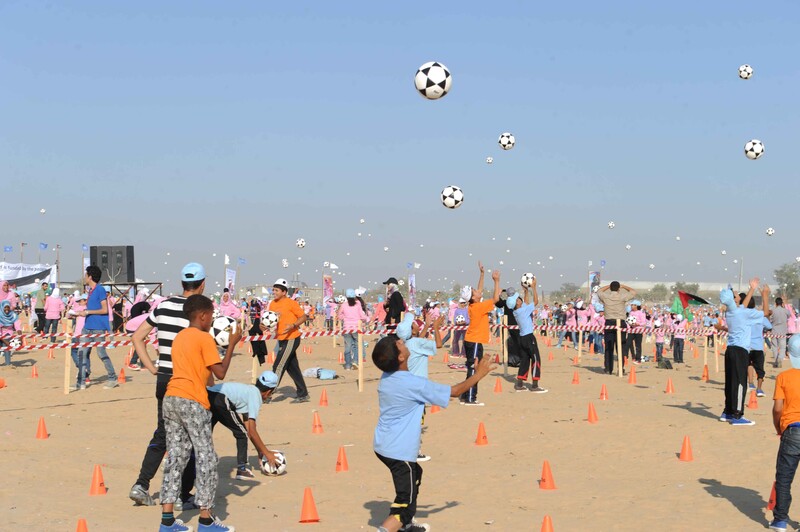Rights and Accountability 28 July 2011

More than 2,000 Gaza children attempted to break the world record for dribbling footballs simultaneously on 14 July 2011.
UNRWAToday, children in the Israeli-occupied and besieged Gaza Strip are attempting to break the world record for flying kites at a single event – they hope that 15,000 colorful kites will take to the sky on a beach in the north of the territory.
The event is sponsored by UNRWA, the UN agency that serves Palestinian refugees, as part of its Summer Games which provides activities for 250,000 children.
The latest record attempt comes as part of a series mounted by children in Gaza. Earlier this month 2,011 children gathered in Rafah to dribble the largest number of footballs simultaneously.
UNRWA officials said the kite-flying attempt would proceed despite an attack on an UNRWA Summer Games facility last night which caused damage to a stage.
UNRWA wants “accountability” for Israel’s “collective punishment”
These record attempts are certainly fun events to lift the spirits of Gaza’s children, but they are undoubtedly also an effort to direct world attention toward the situation of children in Gaza – who are half the 1.6 million population – and are the principal victims of Israel’s siege.
Perhaps not coincidentally, UNRWA – which normally focuses on its humanitarian mission – has taken a much stronger line drawing attention to Israel’s responsibility for the siege. A 14 July UNRWA press release about the football dribbling event states:
“These records breakers evoke other world records,” said UNRWA spokesman Chris Gunness.
“The Israeli blockade of Gaza has lasted longer than some of the most notorious sieges in human history.
“Today, there is a crisis in every aspect of life in Gaza. In education, we need to build 100 new schools in three years for these children who have shown today what they can do when given the chance.
“The International Committee of the Red Cross has called the blockade ‘a collective punishment in clear violation of international humanitarian law’ and has called on the international community ‘to ensure that repeated appeals by States and international organisations to lift the closure are finally heeded’.
“We endorse those calls for accountability, because we need to lift the blockade and give the kids of Gaza a chance to fulfil their true potential.”
UNRWA’s specific reference to “collective punishment” and calls for “accountability” – which could presumably come in the form of war crimes trials of Israeli officials for violation of the Fourth Geneva Convention and other international humanitarian law – appears to be a more forceful position than the agency has taken in the past.
It may be a public recognition by UNRWA that humanitarian assistance can never be enough, when the root cause of the crisis in Gaza are acts of commission by the occupying power, Israel, facilitated and prolonged by international silence and complicity.
It contrasts with the much more docile approach of UN Secretary General Ban Ki-moon, who even appealed to countries to prevent their citizens from joining the recent Gaza Freedom Flotilla 2, thus appearing to legitimize Israel’s hermetic closure of the territory.
UNRWA under fire
Over the years, UNRWA has been a favorite target of Israel and its supporters in the US Congress. Their reasoning has been that UNRWA’s mere existence “perpetuates” the Palestinian “refugee problem.”
Of course this is completely wrong. UNRWA exists to provide services to Palestinian refugees and their descendants, 4.8 million of whom are registered with the agency in Palestine, and in Jordan, Syria and Lebanon. What perpetuates the plight of Palestinian refugees is Israel’s refusal to respect their rights, particularly their right to return home.
But recently, UNRWA was the target of Palestinian ire when it adopted the tagline “UNRWA, the UN Agency for Palestine refugees” on its website. This prompted a storm of criticism from Palestinians who considered it a name change and worried that it presaged a reduction in the agency’s commitments at a time of unprecedented need. In the face of this reaction, UNRWA relented, as a 24 July statement explained:
This tagline was introduced as one of several initiatives aiming to provide a platform for engaging new potential donors and the general public in donor countries who are not familiar with UNRWA and its work. There was no change in the Agency’s name or the nature of its mission. Despite our efforts to explain this, strong, public reactions continued, distracting from the Agency’s ability to focus on daily operational challenges.
Having carefully weighed available options and consulted with stakeholders, it has been decided that “The United Nations Relief and Works Agency for Palestine Refugees in the Near East” will be the only words to appear in UNRWA’s logo. This decision will be reflected on the website as soon as technicians can redesign it accordingly.




